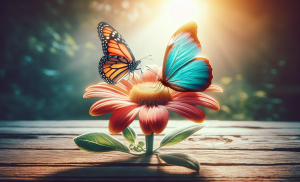Mindful Beekeeping: Connection With Pollinators And Nature
Imagine yourself in the serene beauty of a lush meadow, surrounded by vibrant flowers and the gentle hum of buzzing bees. In this harmonious setting, beekeeping becomes more than just a hobby – it becomes a mindful practice that fosters a deep connection with pollinators and nature. By adopting a mindful approach to beekeeping, you not only contribute to the preservation of these vital creatures but also cultivate a greater appreciation for the interconnectedness of all living beings. Join us on a journey into the world of mindful beekeeping and discover a rewarding and enriching way to engage with the fascinating realm of pollinators and nature.
The Importance of Pollinators
The role of pollinators in nature
Pollinators play a crucial role in the ecosystem by facilitating the reproduction of flowering plants. They are responsible for transferring pollen from the male part of a flower to the female part, enabling the fertilization process and the production of seeds and fruits. This process is vital for the survival of various plant species and is essential for maintaining biodiversity.
The decline of pollinators
Unfortunately, pollinators are facing a significant decline worldwide. Factors such as habitat loss, pesticide use, climate change, and disease have all contributed to the decline of pollinator populations. This decline is alarming as nearly 75% of globally cultivated crops depend at least partially on animal pollination. Without pollinators, food production would be severely affected, leading to a potential food crisis.
The impact on food production
The decline of pollinators directly affects food production as many crops rely on their services for successful pollination. Fruits, nuts, vegetables, and seeds would be in short supply without the assistance of pollinators. It is estimated that pollinators contribute to the production of approximately one-third of the food we consume. Their absence would not only lead to a decrease in crop yield but also result in a decline in the diversity of our diet.
Introduction to Beekeeping
Understanding the basics of beekeeping
Beekeeping, also known as apiculture, is the practice of maintaining colonies of bees in artificial hives for the purpose of honey production and pollination. It involves providing suitable housing, managing bee colonies, and ensuring their well-being. Beekeepers need to understand the basic biology and behavior of bees, as well as the equipment and techniques required for successful beekeeping.
The benefits of beekeeping
Beekeeping offers numerous benefits, both for the beekeeper and the environment. Firstly, it provides a sustainable source of honey, wax, propolis, and other bee-derived products. These natural products can be used for various purposes, including food, skincare, and medicinal products. Additionally, beekeeping supports pollination, helping to enhance the productivity of surrounding crops and promoting biodiversity in the area.
Different types of beehives
There are various types of beehives available for beekeepers to choose from, each with its advantages and disadvantages. Some common types include Langstroth hives, top-bar hives, and Warre hives. Factors such as simplicity, cost, scalability, and ease of inspection should be considered when selecting the most suitable hive for beekeeping purposes.
Mindfulness in Beekeeping
The concept of mindfulness
Mindfulness is the practice of being fully present, aware, and engaged in the current moment. It involves paying attention to the thoughts, feelings, and sensations without judgment. When applied to beekeeping, mindfulness allows beekeepers to deepen their connection with nature and the bees, fostering empathy and understanding of the intricate web of life.
Applying mindfulness to beekeeping
By practicing mindfulness in beekeeping, beekeepers can experience a deeper sense of connection with the bees and their surroundings. It involves observing the bees’ behavior, listening to their humming, and being aware of the natural rhythm of the hive. Mindful beekeepers approach their interactions with the bees with respect, patience, and a gentle touch, promoting harmony and well-being.
Benefits of mindful beekeeping
Mindful beekeeping offers numerous benefits for both the bees and the beekeepers. When beekeepers approach their hives mindfully, they are better able to understand the needs and signals communicated by the bees. This understanding promotes healthier and happier colonies, reducing stress and disease. Moreover, practicing mindfulness in beekeeping allows beekeepers to cultivate a greater appreciation for the beauty and interconnectedness of nature.
Bonding with the Bees
Developing a relationship with the bees
Developing a relationship with the bees is one of the most rewarding aspects of beekeeping. By spending time with the bees, observing their behavior, and working in harmony with them, beekeepers can establish a deep bond based on trust and mutual understanding. This relationship allows beekeepers to better care for and manage their hives.
Understanding bee behavior
Understanding bee behavior is crucial for successful beekeeping. Bees communicate with each other through intricate dances, pheromones, and body movements. By learning to interpret these signals, beekeepers can gain valuable insights into the health and well-being of the hive. It also helps in identifying possible issues or challenges that need attention.
Communication with the bees
Communication with the bees is a fundamental aspect of beekeeping. Beekeepers can communicate with their bees by using gentle and non-threatening methods, such as smoke, to calm the bees during hive inspections. Regular and careful observation of the bees enables beekeepers to assess the colony’s health and address any potential problems promptly. Establishing a trust-based communication system with the bees is essential for sustainable and responsible beekeeping.
Promoting Biodiversity
Creating a bee-friendly environment
Creating a bee-friendly environment is essential for promoting biodiversity and supporting healthy pollinator populations. To create an ideal habitat for bees, beekeepers can plant a diverse range of flowering plants that provide a continuous source of nectar and pollen throughout the year. Avoiding the use of pesticides and providing suitable nesting sites, such as bee hotels or log piles, further enhances the bee-friendly environment.
Choosing pollinator-friendly plants
Selecting pollinator-friendly plants is crucial in promoting biodiversity and supporting the health of pollinators. Opting for native plants is often the best choice as they have evolved alongside local pollinators, providing a natural and reliable food source. Additionally, planting a variety of plants with different flower shapes, colors, and blooming periods can attract a diverse range of pollinators and support their nutritional needs.
Conserving natural habitats
Preserving and conserving natural habitats is vital for the long-term survival of pollinators. Protecting wild meadows, forests, and wetlands helps maintain a healthy ecosystem and provides essential forage and nesting sites for bees. Avoiding the destruction of natural habitats through responsible land management practices and supporting habitat restoration initiatives can contribute significantly to the conservation of pollinators.
Holistic Approach to Beekeeping
Considering the interconnectedness of nature
Adopting a holistic approach to beekeeping involves recognizing and respecting the interconnectedness of nature. Beekeepers acknowledge that their actions can have far-reaching impacts on the bees, other wildlife, and the wider ecosystem. By considering the broader ecological context and implementing sustainable practices, beekeepers can contribute to the overall health and balance of the environment.
Implementing sustainable practices
Sustainability is a key principle of holistic beekeeping. Beekeepers can implement various sustainable practices, such as organic hive management, reduced chemical usage, and responsible honey extraction techniques. Using integrated pest management strategies and minimizing the use of synthetic treatments helps maintain the health and vitality of the bees and the ecosystem they inhabit.
Organic beekeeping methods
Organic beekeeping methods prioritize the well-being of the bees and the preservation of natural ecosystems. Organic beekeepers refrain from using chemical pesticides, antibiotics, or synthetic materials in their hives. Instead, they focus on enhancing the bees’ natural defenses, creating disease-resistant colonies, and providing natural and chemical-free solutions to common challenges. Organic beekeeping methods not only promote sustainability but also produce high-quality honey and other bee products.
Harvesting Honey and Bee Products
Understanding honey production
Understanding the process of honey production is essential for beekeepers. Bees collect nectar from flowers, which they then convert into honey through a process of enzymatic digestion and evaporation. The honey is stored in the wax combs of the hive, where it ripens and becomes ready for harvesting. Beekeepers need to ensure that honey extraction is done at the right time to maximize quality and quantity.
Collecting honey in a mindful manner
Collecting honey in a mindful manner involves considering the well-being of the bees throughout the process. Beekeepers should use gentle and non-invasive methods to extract the honey, minimizing stress and disruption to the hive. It is also important to leave sufficient honey reserves for the bees to sustain themselves during periods of scarcity, especially in colder months.
Utilizing other bee products
Beekeeping offers a range of other valuable products in addition to honey. Beeswax, propolis, royal jelly, and pollen are all beneficial by-products of beekeeping. Beeswax can be used for candle-making, skincare products, and natural remedies. Propolis has antimicrobial properties and is used in various health formulations. Royal jelly and pollen have nutritional and medicinal properties and can be consumed as dietary supplements.
Educating Others
Raising awareness about the importance of pollinators
Educating others about the importance of pollinators is crucial in creating a broader understanding and appreciation for these vital creatures. Beekeepers can actively engage in community outreach programs, school presentations, or public events to raise awareness about the role of pollinators in food production and biodiversity. Sharing knowledge about the challenges faced by pollinators and the actions individuals can take to support them can inspire positive change.
Teaching sustainable beekeeping practices
Promoting sustainable beekeeping practices is essential for the long-term viability of beekeeping and the well-being of bees. Beekeepers can offer workshops or training sessions to educate aspiring beekeepers about responsible hive management, organic beekeeping methods, and the importance of biodiversity conservation. By passing on their knowledge and skills, experienced beekeepers can contribute to the development of a new generation of environmentally conscious beekeepers.
Organizing community initiatives
Organizing community initiatives focused on pollinator conservation can have a significant impact on local ecosystems. Beekeepers can collaborate with local organizations, schools, and volunteers to establish pollinator-friendly habitats, plant native wildflowers, or create educational programs for the community. These initiatives not only promote pollinator conservation but also foster a sense of community and shared responsibility for the environment.
Potential Challenges and Solutions
Dealing with common beekeeping challenges
Beekeeping is not without its challenges. Beekeepers may encounter issues such as swarming, varroa mites, hive diseases, or predators. However, by staying informed, implementing preventive measures, and seeking professional advice when needed, beekeepers can effectively manage these challenges. Regular hive inspections, proper hive hygiene, and timely intervention are key to maintaining the health and well-being of the bees.
Addressing bee diseases and pests
Bee diseases and pests pose a significant threat to bee colonies. Common diseases include American foulbrood, European foulbrood, and chalkbrood, while pests like varroa mites, wax moths, and small hive beetles can wreak havoc on hives. Beekeepers should be vigilant in monitoring the health of their colonies, implementing appropriate disease management strategies, and using integrated pest management techniques to control pests while minimizing chemical usage.
Finding sustainable solutions
In the face of challenges, finding sustainable solutions is essential. Beekeepers should strive to find innovative and environmentally friendly approaches to tackle common issues in beekeeping. This may involve exploring biological control methods for pests, adopting natural disease management techniques, or implementing hive designs that promote bee health and productivity. Collaboration with researchers, fellow beekeepers, and experts in the field can facilitate the development of sustainable solutions in beekeeping.
Care and Well-being of Beekeepers
Physical and mental health considerations
Beekeeping can be physically demanding, requiring beekeepers to work in various weather conditions and lift heavy equipment. It is important for beekeepers to prioritize their physical health by using proper protective gear, maintaining good posture, and practicing safe lifting techniques. Alongside physical health, beekeepers should also pay attention to their mental well-being, finding moments of relaxation and enjoyment in their interactions with the bees.
Safety measures for beekeepers
Ensuring safety is paramount in beekeeping. Beekeepers should wear protective clothing, including a bee suit, gloves, and a veil, to prevent bee stings. It is important to approach the bees calmly and gently, using smoke or other calming techniques during hive inspections. A well-equipped first aid kit and knowledge of basic first aid procedures should be readily available to handle any bee stings or accidents that may occur.
Creating a support network
Beekeeping can sometimes be challenging and overwhelming, especially for beginners. Creating a support network of fellow beekeepers, local associations, or online communities can provide valuable guidance, advice, and encouragement. Sharing experiences, exchanging knowledge, and seeking assistance from experienced beekeepers can help beekeepers navigate through challenges and enhance their overall beekeeping journey.
In conclusion, pollinators play a crucial role in nature, and their decline poses significant challenges for food production and biodiversity. Beekeeping offers an opportunity to cultivate a deeper connection with pollinators and nature. By applying mindfulness, bonding with the bees, promoting biodiversity, adopting a holistic approach, and engaging in education and community initiatives, beekeepers can contribute to the well-being of pollinators and the environment. Emphasizing sustainable practices, addressing challenges, and prioritizing the care of both the bees and the beekeepers ensures a harmonious and rewarding beekeeping experience.

















